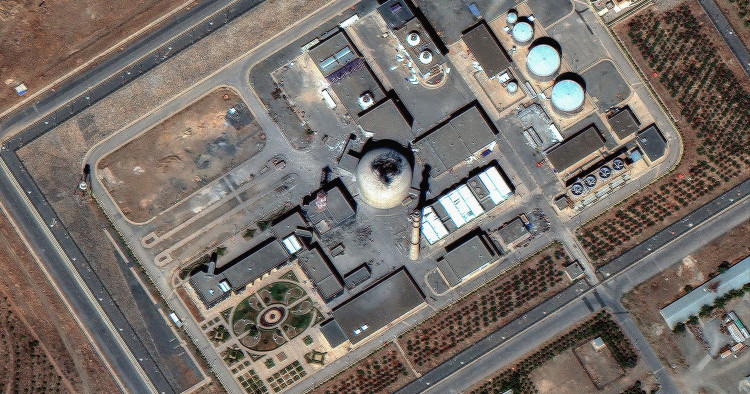As the Israel-Iran conflict intensifies, warnings are growing louder that the war could result in hazardous and destructive radiological spillover to much of the region. But the posturing of various key actors in the Gulf and beyond has opened the door to a broader political settlement between the United States and Iran that could end the hostilities before such a dangerous scenario comes to pass.
Russia has warned Israel that striking Iranian nuclear sites, particularly the Russian-built Bushehr plant, could spark a catastrophe. At the same time, Gulf Arab states, caught between Iranian warnings and the presence of US military assets on their soil, are growing increasingly anxious about the war’s regional fallout. With critical infrastructure like Bushehr potentially in the crosshairs, the stakes now include radiation risk, water insecurity, and the disruption of everyday life across the Gulf.
Russia’s warnings have been explicit. Rosatom chief Alexei Likhachev cautioned that a strike on Bushehr, where hundreds of Russian technicians work, could trigger a disaster akin to Chernobyl. The Israeli military briefly claimed on June 19 to have struck the facility, a statement it later retracted, but the episode heightened concerns. While Likhachev insisted Bushehr remains “normal and under control,” the message from Moscow is clear: escalation near nuclear sites risks global repercussions.
The Arab Gulf states are especially vulnerable. An attack on Bushehr could release radioactive material into coastal waters. Given much of the Arabian Peninsula’s heavy reliance on desalination for drinking water, even a limited radiological incident could threaten regional water security. Facilities in countries like the United Arab Emirates, Qatar, and Saudi Arabia are not designed to filter radioactive contamination, and any disruption could impact millions. These states are also deeply exposed due to their hosting of US forces, making them potential targets should Iran retaliate.
Tehran has repeatedly warned against allowing American attacks to be launched from Gulf territory. Reports suggest that Iran, through Qatari mediation, delivered messages to Gulf Cooperation Council (GCC) states emphasizing that any involvement in US strikes would make them legitimate targets. The Iranian military’s relative precision, demonstrated in its 2020 retaliatory strike on the US’s Ain al-Assad base in Iraq, adds weight to the threat.
Despite the gravity of the situation, Iran’s so-called allies, Russia and China, have offered Tehran little more than rhetorical support. Russia, preoccupied with Ukraine and weakened by the collapse of Bashar al-Assad’s regime in Syria, appears in no position to materially defend Iran for now. It has condemned Israeli strikes and called on the United Nations to take action, but there are no signs of military assistance. Moscow has avoided formal defense commitments to Tehran and now produces Iran’s Shahed drones domestically, reducing its reliance on Iranian imports. Still, Moscow fears regime change in Tehran could upend key joint infrastructure and energy projects, including transport corridors to India.
China, meanwhile, has called for a cease-fire since the war began and continues to press for diplomacy through international platforms, with limited success. Beijing, a major importer of Iranian and Gulf oil, is deeply concerned that further Israeli strikes could destabilize energy markets. Yet China, like Russia, has so far refrained from intervening directly or offering Iran tangible backing.
This strategic caution creates an opening for the United States. Neither Russia nor China is shaping events in the region at the strategic level, leaving Iran diplomatically isolated. Gulf states, for their part, are urging Washington to avoid giving carte blanche to all Israeli objectives, particularly regime change in Iran, which could further destabilize the region and threaten US interests. In this moment of volatility, the cautious stances of Russia, China, and Gulf states reflect their fear of escalation. But they also highlight an opportunity for measured US leadership to prevent a wider war and reassert strategic influence in a region once again on edge. Trump could use this moment to push Tehran toward a broader settlement that may help reassert a level longer-term stability to a region that has been undergoing dramatic shifts since Oct. 7, 2023.
Alex Vatanka is a Senior Fellow at MEI.
Photo: Satellite image (c) 2025 Maxar Technologies
The Middle East Institute (MEI) is an independent, non-partisan, non-for-profit, educational organization. It does not engage in advocacy and its scholars’ opinions are their own. MEI welcomes financial donations, but retains sole editorial control over its work and its publications reflect only the authors’ views. For a listing of MEI donors, please click here.













